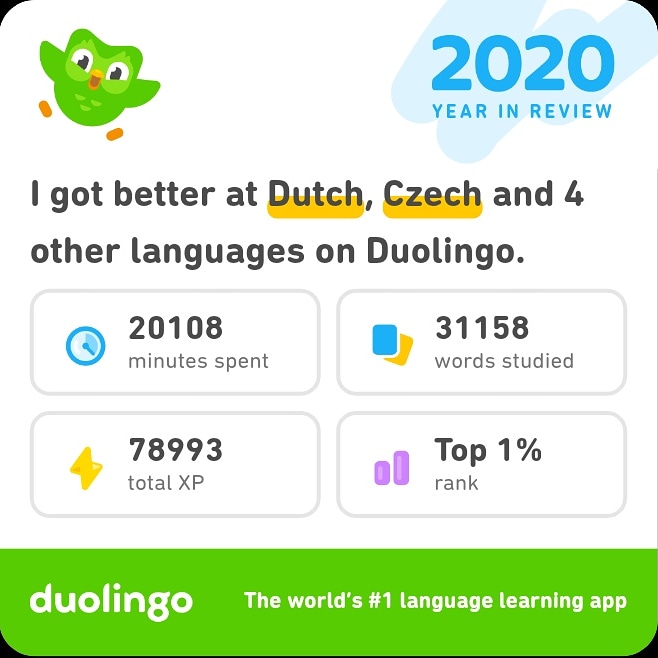
Here’s a recording in a mystery language.
Do you know or can you guess the language, and do you know where it’s spoken?

Here’s a recording in a mystery language.
Do you know or can you guess the language, and do you know where it’s spoken?
I’ve been studying various languages on Duolingo for nearly four years now. My current streak is at 1,238 days today, and I had a 96 day streak before then, so for the past 1,334 days I have been studying at least a little every single day. This year I’ve averaged about 1 hour a day, and at the moment I’m focusing on Dutch and Spanish. Last week I came top of the diamond league – the highest you can get.

So far I’ve completed courses in Swedish, Danish, Russian, Czech, Esperanto, Spanish and Romanian. The courses and the app have changed quite a bit – more for some languages than others. New lessons, tips and levels have been added, especially for Spanish, which has at least 3 or 4 times more lessons than the other languages I’ve studied. That makes sense, I suppose, as there are currently 28.6 million people learning Spanish on Duolingo – far more than any other language. Today I noticed that there are new grammar lessons in Spanish, which are useful, and there are also Spanish podcasts, which I haven’t listened to yet.
One aspect of Duolingo I’m not keen on is the hearts system. At the start of each day you have 5 hearts. Every time you make a mistake you loose one. If you run out of hearts, you can ‘buy’ more, refresh a topic you have already completed to gain more, or wait until the next day. Or you can subscribe and get unlimited hearts. Making mistakes is part of language learning, and not something you should have to worry about, as long as you learn from them. You sometimes get tips when you mistakes in Spanish, which are useful, but not in other languages.
If you’ve studied other languages on Duolingo, how do they compare to Spanish in terms of numbers and types of lessons?
I expect that there are more lessons, etc for French, German, Japanese, Italian, Korean and Chinese – the most popular languages after Spanish – than for less popular languages.
A desire path is “a path created as a consequence of erosion caused by human or animal foot traffic. The path usually represents the shortest or most easily navigated route between an origin and destination.” They tend to appear as shortcuts where constructed paths are not direct, have gaps, or don’t exist. Desire paths are also known as desire lines (in transport planning), game trails, social trails, fishermen trails, herd paths, cow paths, elephant paths, goat tracks, pig trails, use trails or bootleg trails [source].

An example of a desire path on Roman Camp in Bangor
In Dutch a desire path is olifantenpad [ˈoː.li.fɑn.tə(n)ˌpɑt] or olifantenpaadje (elephant path) because elephants tend to choose the shortest path to wherever they go, and make paths on the way. These terms became popular particularly in 2011 after the publication of the book Olifantenpaadjes by Jan-Dirk van der Burg and Maarten ‘t Hart, in which they document such paths [source].
When such paths are made by animals, they are known as wildpad, wildspoor or (wild)wissel [source].
Are there other names for them?
Another kind of path is the geitenpad or goat path, which is may be narrow, temporary and dangerous, and may not be recognizable as a path. They are kind of the opposite of olifantenpad.
Other types of Dutch paden (paths) include:
In French a desire path is known as a chemin de l’âne (donkey path) or ligne de désir (line of desire).
What about in other languages?

Here’s a recording in a mystery language.
Do you know or can you guess the language, and do you know where it’s spoken?
If you mislay your bijou bijous you could say that have a bijou problemette.
The word bijou can mean small and elegant (of a residence – often ironic),
intricate or finely made, or a jewel, a piece of jewellry; a trinket or a small intricate piece of metalwork. In the above sentence bijou bijous means ‘finely made jewelery’, and a bijou problemette means ‘a little problem’, an example of British understatement.
Bijou, as jewellery, comes from the French bijou (a piece of jewellery), from the Breton bizoù (ring), from biz (finger), from the Proto-Celtic *bistis (finger) [source].
Bijou, as in small and elegant, etc, comes from the Mediterranean Lingua Franca (Sabir) bijou, from the Occitan pichon (small, little), from the Late Latin pitinnus, possibly from Proto-Celtic *kʷezdis (piece, portion) [source], which is also the root of peth (thing, object) in Welsh, cuid (part portion) in Irish, and related words in other Celtic languages.
As today is the first day of December, I thought I’d look into the origins of the names for this month in various languages.
December comes from the Middle English December/Decembre, from the Old French decembre, from the Latin december, from decem (ten) and the adjectival suffix -ber. December was the tenth month in the Roman calendar, which started in March [source]. The days between December and March were not included in the calendar as part of any month. Later they became January and February and were added to the beginning of the calendar [source].
In the Old English December was known as Ġēolamonaþ/Gēolmōnaþ/Iūlmōnaþ (“Yule month”) or ǣrra ġēola (“before Yule”). The word Yulemonth apparently exists in modern English, although is rarely used [source]. December is associated with Yuletide / Christmas in a few other languages: mí na Nollag (“month of Christmas”) in Irish, Mee ny Nollick (“month of Christmas”) in Manx, and joulukuu (“yule month”) in Finnish and Võro.
In many languages the name of this month is a version of December, but there are some exceptions.
In Aragonese December is abiento, in Asturian it’s avientu, in Basque it’s abendu and in Occitan it’s abén. These all come from the Latin adventus (arrival, approach, advent), from adveniō (arrive) and the suffix -tus [source].
In Belarusian December is снежань (sniežań) [ˈsʲnʲeʐanʲ], which comes from снег (snjeh – snow) [source]. The Cherokee name for December is also related to snow: ᎥᏍᎩᎦ (vsgiga) or “snow moon” [source].
In Proto-Slavic the month after the Winter solitice was known as *prosinьcь. There are a number of possible roots for this word: *siňь (gray), *sijati (to shine, glow – referring to the winter solstice) or *prositi (to pray – referring to Christmas). Descendents in modern Slavic languages include prosinec (December) in Czech, просинац (December) in Serbian, and prosinec (January) in Slovenian.
In Welsh December is Rhagfyr [ˈr̥aɡvɨ̞r / ˈr̥aɡvɪr] (“foreshortening”), because it’s a time when days get shorter [source].
December is “twelve month” or “month twelve” in Chinese: 十二月 (shí’èryuè), Japanese: 十二月 (jūnigatsu), Korean: 십이월 (12월/十二月/12月 – sipiweol), and Vietnamese: tháng mười hai (𣎃𨑮𠄩).
Are there other interesting names for December in other languages?
You can find the names of months in many languages here.

Here’s a recording in a mystery language.
Can you identify the language, and do you know where it’s spoken?
If a French-speaking person told you that they have the cafard, would you know what they meant?
In French, avoir le cafard means to feel down, blue or to have the blues. The word cafard [ka.faʁ] means depression, sadness, melancholoy. It also means a false devotee, hypocrite or bigot; an informant; or a cockroach [source].
It comes from the Arabic كَافِر (kāfir – unbeliever, disbeliever; farmer; ungrateful), from كَفَرَ (kafara – to disbelieve, cover, conceal) [source].
Related words and expressions include:
How would you describe someone who informs on / betrays people, or a cafardeur/cafardeuse, and what they do (cafarder)?
What do the words thank you and charisma have in common?
Well, charisma (personal charm or magnetism) comes from the Ancient Greek χᾰ́ρῐσμᾰ (khárisma – grace, favour, gift), from χᾰρῐ́ζομαι (kharízomai – I show favor), from χᾰ́ρῐς (kháris – grace), from χαίρω (khaírō – I am happy) [source].
The Greek word for thank you, ευχαριστώ (efcharistó), comes from the same root, via εὐχαριστῶ (eukharistô), a contracted form of εὐχαριστέω (eukharistéō – to bestow a favour on, oblige; to be grateful, thankful; to thank, give thanks), from εὐχάριστος (eukháristos – grateful, thankful; pleasant, agreeable), from εὐ- (eu – good), χᾰ́ρῐς (kháris – grace) & -τος (-tos) [source].
The word Eucharist also comes from the same root, via the Middle English eukarist, from Old French, from the Ecclesiastical Latin eucharistia [source], as does the name Charis. In Greek mythology Charis was one of the Graces or Charites (Χάριτες), goddesses of charm, beauty, nature, human creativity and fertility, and wife of Hephaestus (Ἥφαιστος), the god of blacksmiths, metalworking, carpenters, craftsmen, artisans, sculptors, metallurgy, fire [source].
I decided to look into the origins of the charisma today because one of the YouTube channels I found recently is called The Charismatic Voice. Through this this channel I’ve discovered various singers and groups, including some who sing in languages other than English. As I enjoy listening to and singing songs in a variety of languages, this is great for me.
Here’s an example of a Mongolian song:

Here’s a recording in a mystery language.
Can you identify the language, and do you know where it’s spoken?